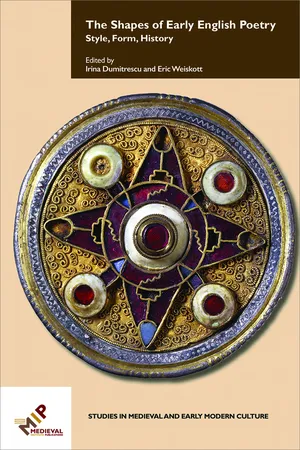Time in the Wanderer
The Wanderer—both the poem and its elusive speaker—is obsessed with time.10 The opening lines of the poem illustrate the depth of this investment:
Oft him anhaga are gebideð,
Metudes miltse, þeahþe he modcearig
geond lagulade longe sceolde
hreran mid hondum hrimcealde sæ.
(Often the lone-dweller expects mercy for himself, the
Measurer’s mercy, although he, troubled in heart, must
throughout the seaways, for a long time, stir with his
hands the ice-cold sea.)
(1–4)11
These first few lines already delineate several temporal registers. Oft implies the duration of the anhaga’s ordeal, both the length of time he must wait for or expect (gebidan) mercy as well as the repetition of this waiting, itself implying a duration. The poem reveals this perceived length as an obligation: as it describes the anhaga’s actions within his exile (he “must [...] stir with his hands the ice-cold sea”), the poem notes that he longe sceolde experience this fate. He “must [...] for a long time” be in exile. What the speaker waits for—are, mercy—is deferred by the fate he is obliged to suffer.12 Even the verb hreran suggests a kind of circularity. It appears most often in the Leechbook and usually refers to the kind of stirring that one might do with a pot.13 Beyond figuring a circle, hreran implies a repetitive act associated with the cyclical temporality in which the speaker is mired. The ice-covered waves literally bind the wanderer’s boat, but also function as a metaphor for his relationship to loss.
Even the word oft recurs throughout the poem, indicating its engagement with cyclical rather than linear temporality. In each instance, the recurrence of oft suggests a cycle, the presence of a repeatable and repeating past that continues in some variation into the present. As the main speaker of the poem is introduced, for example, his monologue describes an action he takes repeatedly: “Oft ic sceolde ana uhtna gehwylce / mine ceare cwiþan” (Often I must alone, each of the hours before dawn, speak my sorrows) (8–9a). As it does in the opening lines, here the poem conjoins a sense of obligation with a sense of repetition—oft precedes sculan. Through this juxtaposition, the poem delineates the precise cause of the misery implicit in exile, and does so in the exile’s own voice. The anhaga is obligated to voice his cares alone—in no small part due to the fact that there is no one left with whom he could share them: “nis nu cwicra nan / þe ic him modsefan minne durre / sweotule asecgan” (there is now no one living to whom I might dare to express all my heart) (9b–11a).14 Whatever else has happened, the speaker finds himself isolated, and that isolation is presented as an inability to find anyone in whom to confide.15 This inability leads to his repeated voicing of cares, uhtna gehwylce—each morning. What initially appears as “often” becomes each day at the same time, in the early morning. His repetition marks each new day with a return to his cares. He is obliged to experience a cyclical time—a time in which he mourns the people to whom he might have spoken.
The speaker contrasts the cyclicality of being in exile—stirring with one’s hands the ice-chilled waves—with his previous life, characterized (as many scholars have observed) by warmth and community rather than cold and loss.16 In his meditation on the loss that pervades his exile, the speaker emphasizes the repetition inherent in his inability to seek solace in human company:
Swa ic modsefan minne sceolde,
oft earmcearig, eðle bidæled,
freomægum feor feterum sælan,
siþþan geara iu goldwine min[n]e
hrusan heolstre biwrah.
(As I must my heart/soul—often, care-worn, deprived
of a native land, far from my kinsmen—fasten with
fetters, since long ago I covered my gold-friend in the
shadows of the earth. [emphasis mine])
(19–23a)
Here, the cyclical time of mourning is placed in direct opposition to the singularity of a time in which this mourning was set into motion. The temporality of these actions is complex: on the one hand, the speaker says he must often (oft) bind his heart with fetters—a metaphor that implies a simultaneous sense of restraint as well as the pain, mental and physical, that accompanies that psychological action.17 The tightness of the chest,18 which the speaker keeps bound so as not to betray his sorrow, stems in time from the specific event that causes his presumed exile: the death of his lord (goldwine minne, literally “my gold-friend”). His actions, repeated often, highlight duration: his lord died in “geara iu,” in a time now accessible only to memory.19 The enduring sense of loss implicit in geara iu contrasts with the repetition implicit in oft. It is here, the poet implies, that the speaker’s exile began, and with it, his pain.
Parallel to this enduring pain, the poem evokes scenes of community that are deeply imbued with warmth and solace. In his dream, the speaker seems to relive some of the deeply treasured moments he experienced with his now-departed lord.
[Þ]inceð him on mode þæt he his mondryhten
clyppe and cysse, ond on cneo lecge
honda and heafod, swa he hwilum ær
in geardagum giefstolas breac.
(It seems to him in his mind that he clasps and kisses
his liegelord, and lays hand and head on his knee,
just as he did at times before, in olden days, when he
enjoyed the gift-stool.)
(41–44)
The scene in question is narrated in the present tense—the wanderer “þinceð him on mode” (thinks in his mind) that he “clyppe and cysse” (clasps and kisses) his lord. The verbs for the wanderer’s actions are all subjunctive—the scenes that the wanderer imagines are ultimately a fantasy, but they are one based in a real past. Su...
